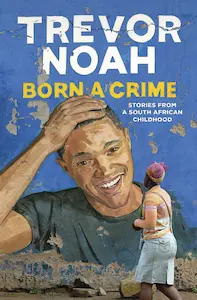Born a Crime - Summary
Trevor Noah

Introduction
Born a Crime is a captivating memoir written by Trevor Noah, the well-known South African comedian and television host. In this book, Noah shares his extraordinary life story, growing up as a mixed-race child in apartheid South Africa. Through a combination of personal anecdotes and insightful observations, Noah provides a unique perspective on the complexities of race, identity, and survival in a society deeply divided by racial segregation. This book summary aims to provide an overview of the key themes, memorable anecdotes, and powerful messages conveyed in Born a Crime.
Early Life in Apartheid South Africa
Noah begins his memoir by recounting his early years, emphasizing the absurdity of his existence as a mixed-race child during the apartheid era. The apartheid regime strictly enforced racial segregation, and Noah’s birth to a black Xhosa mother and a white Swiss father made him an illegal “crime” under the law. Noah vividly describes the challenges his mother faced in hiding his true identity, often resorting to disguises and elaborate strategies to protect him from the authorities.
The Power of Language and Humor
One of the central themes in Born a Crime is the power of language and humor in overcoming adversity. Growing up in a society deeply divided by race, Noah quickly learned the importance of language as a tool for survival. He highlights how his ability to speak multiple languages, including English, Xhosa, Zulu, and Afrikaans, allowed him to navigate different racial and cultural spaces. Moreover, Noah’s keen sense of humor served as a coping mechanism, enabling him to find moments of joy and connection even in the most challenging circumstances.
The Complexity of Racial Identity
Throughout the book, Noah explores the complexities of racial identity in a society that rigidly categorized individuals based on their skin color. As a mixed-race child, he struggled to fit into predefined racial categories, often experiencing a sense of displacement and alienation. Noah reflects on the absurdity of racial classification, highlighting how arbitrary it was to determine one’s worth and opportunities based solely on the color of their skin. His personal experiences shed light on the absurdity and injustice of apartheid’s racial hierarchy.
Mother’s Unconditional Love and Resilience
Noah’s memoir pays tribute to his remarkable mother, Patricia Nombuyiselo Noah, who played a pivotal role in shaping his character and worldview. Despite the immense challenges she faced as a single mother in apartheid South Africa, Patricia displayed unwavering love, strength, and resilience. Noah recounts numerous anecdotes that showcase his mother’s determination to provide him with a better life and instill in him a sense of morality and compassion.
The Harsh Realities of Poverty and Violence
Born a Crime also delves into the harsh realities of poverty and violence that plagued South Africa during Noah’s upbringing. He vividly describes the townships, where poverty and crime were rampant, and survival often meant resorting to illegal activities. Noah’s personal experiences with violence, including witnessing his mother being shot, provide a stark reminder of the dangers and injustices that many South Africans faced on a daily basis.
Education as a Path to Success
Despite the numerous obstacles he encountered, Noah emphasizes the transformative power of education in his life. He credits his mother’s unwavering belief in the importance of education for his eventual success. Noah’s determination to excel academically, coupled with his wit and charm, opened doors for him and eventually led to his career in comedy and television. His story serves as an inspiration to many, highlighting the potential for upward mobility through education.
Confronting Racism and Prejudice
Noah’s experiences with racism and prejudice are a recurring theme in his memoir. He recounts instances of being treated as an outsider, facing discrimination from both black and white communities. Through these encounters, Noah offers a nuanced exploration of racism, challenging simplistic notions of good and evil. He invites readers to confront their own biases and reflect on the ways in which prejudice is perpetuated and reinforced within society.
Lessons in Empathy and Compassion
Throughout Born a Crime, Noah emphasizes the importance of empathy and compassion in bridging divides and fostering understanding. He shares anecdotes that highlight moments of connection and humanity, demonstrating that even in a society deeply divided by race, people have the capacity to transcend prejudice and embrace one another’s humanity. Noah’s own experiences of being an outsider and his ability to find common ground with people from diverse backgrounds serve as powerful reminders of the importance of empathy in creating a more inclusive society.
The Legacy of Apartheid
Noah concludes his memoir by reflecting on the lasting impact of apartheid on South Africa and its people. He acknowledges the progress made since the end of apartheid but also highlights the enduring consequences of systemic racism and inequality. Noah’s personal journey serves as a microcosm of the larger struggle for racial justice and equality in South Africa and beyond.
Conclusion
Born a Crime is a compelling memoir that offers a thought-provoking exploration of race, identity, and resilience. Through his personal anecdotes and sharp wit, Trevor Noah provides readers with a unique perspective on the complexities of growing up in apartheid South Africa. His story serves as a testament to the power of language, humor, and empathy in overcoming adversity and challenging deeply ingrained prejudices. Born a Crime is a must-read for anyone seeking a deeper understanding of the human experience and the enduring impact of systemic racism.